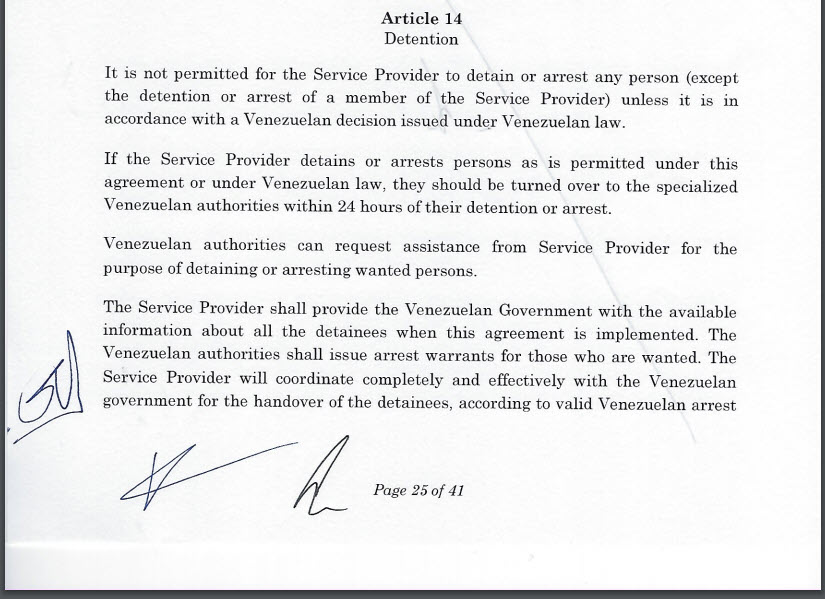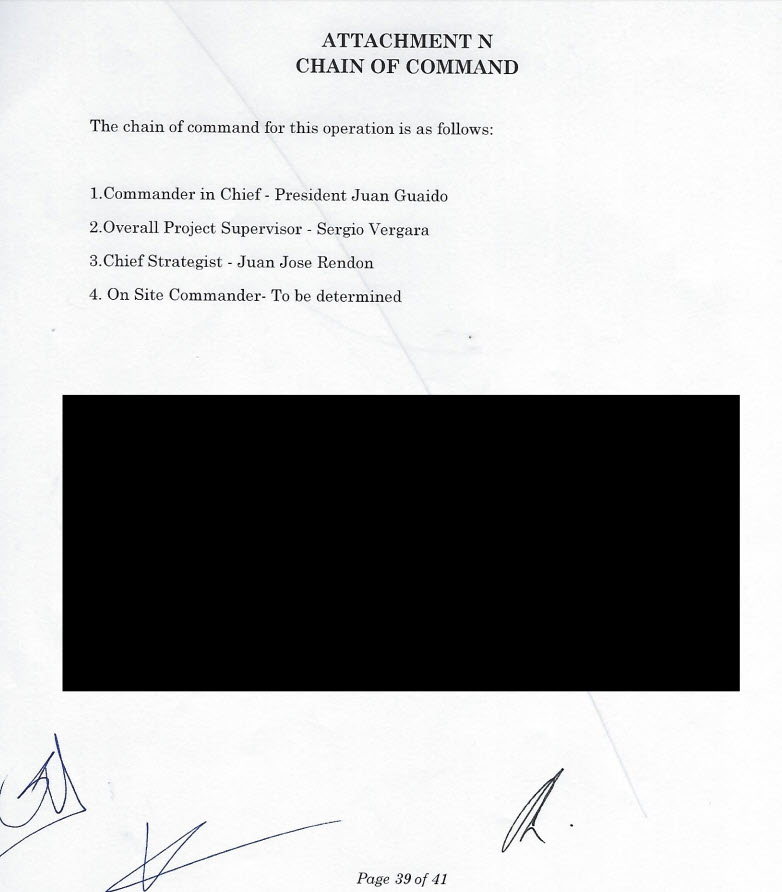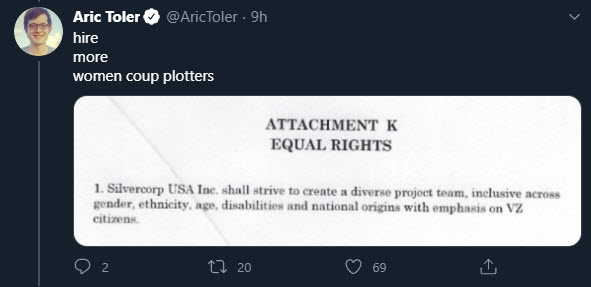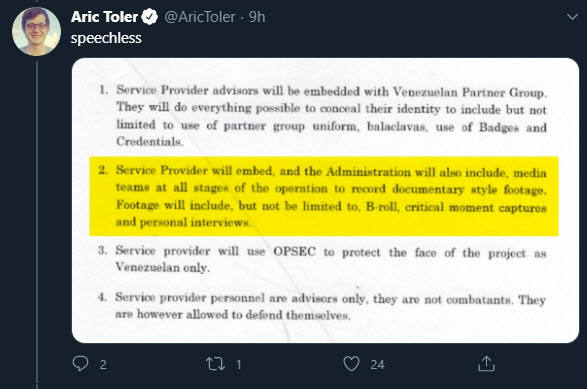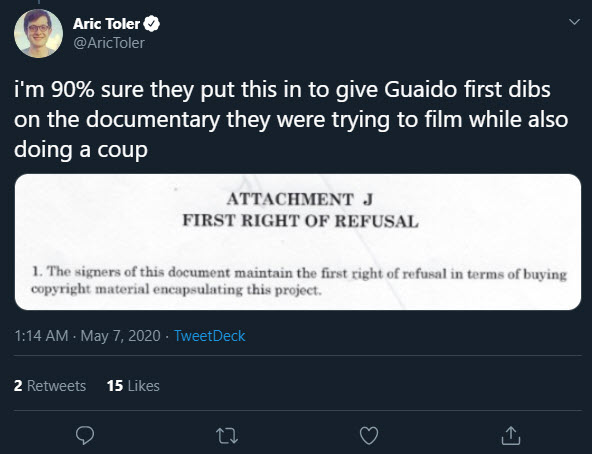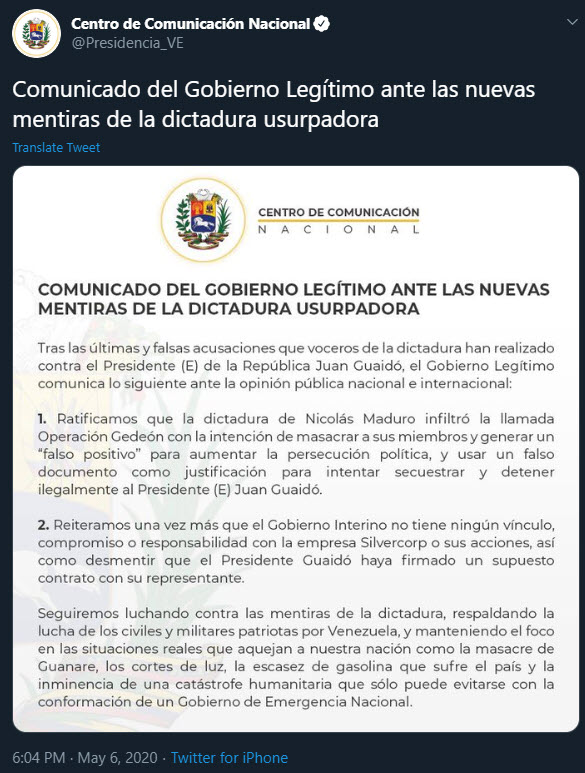The Venezuela/Silvercorp USA Saga Keeps Getting Weirder
Earlier this week, we wrote about “Operación Gedeón”, a surreal and ultimately doomed military operation conducted by Silvercorp USA and a group of Venezuelan expatriates with the aim of instigating a nationwide rebellion against the government and capturing its high-ranking members, including President Maduro himself.
The failed plot has attracted a significant amount of media attention, with outlets like Vice reporting that Airan Berry, one of the two U.S. citizens involved in the raid currently in custody in Venezuela, “appears to be really into QAnon”. The Venezuelan authorities aired his confession video earlier today, in which he said that his mission was to seize an airport tower and other targets in Caracas, including the Miraflores Palace (a Venezuelan media outlet reported that Berry was referencing the tower at the Simon Bolivar International Airport, which is outside of Caracas, but this is not clear from Berry’s video confession. Given the nature of the operation, and another reference by Berry in his confession video to being tasked with securing the La Carlota airport airstrip in Caracas, it is likely that this is the airport that he meant). Luke Denman, the other U.S. citizen in custody, appeared in a “heavily edited” confession video yesterday and may have been telegraphing through eye movements that he was being coerced into implicating Trump in the plot (you can watch Luke’s video here).
Since our earlier publication, more details have come to light about Silvercorp USA’s involvement in the plot, mainly via the Washington Post publishing a contract between the company and signed by high-ranking members of the Venezuelan opposition (but not its leader, Juan Guaido). This contract outlines, among other matters, the operational parameters of the Silvercorp USA mercenary force during its mission in Venezuela. The authenticity of the document was verified by both the Washington Post, which published it, as well as one of its signatories, a man named J.J. Rendón.
Some Contract Revelations
Last night, the Washington Post published a 41-page document outlining the parameters of the agreement with Silvercorp USA. The document includes sections defining the rules of engagement, definitions of hostile forces, and how to handle the capture of Venezuelan citizens during the operation.
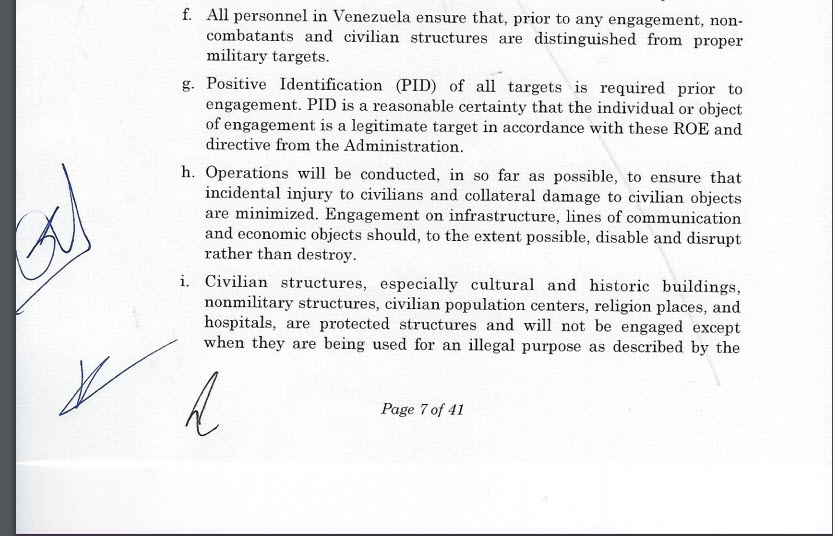
Page 7 of the document contains a section granting “protected” status to civilian structures during the operation (Source: The Washington Post)
According to the Washington Post, this document was provided to them by “Venezuelan opposition officials” under the condition that one section of the document be redacted. There is a redacted section on page 39:
The document also includes a signature page that, notably, does not include that of opposition leader Juan Guaido:
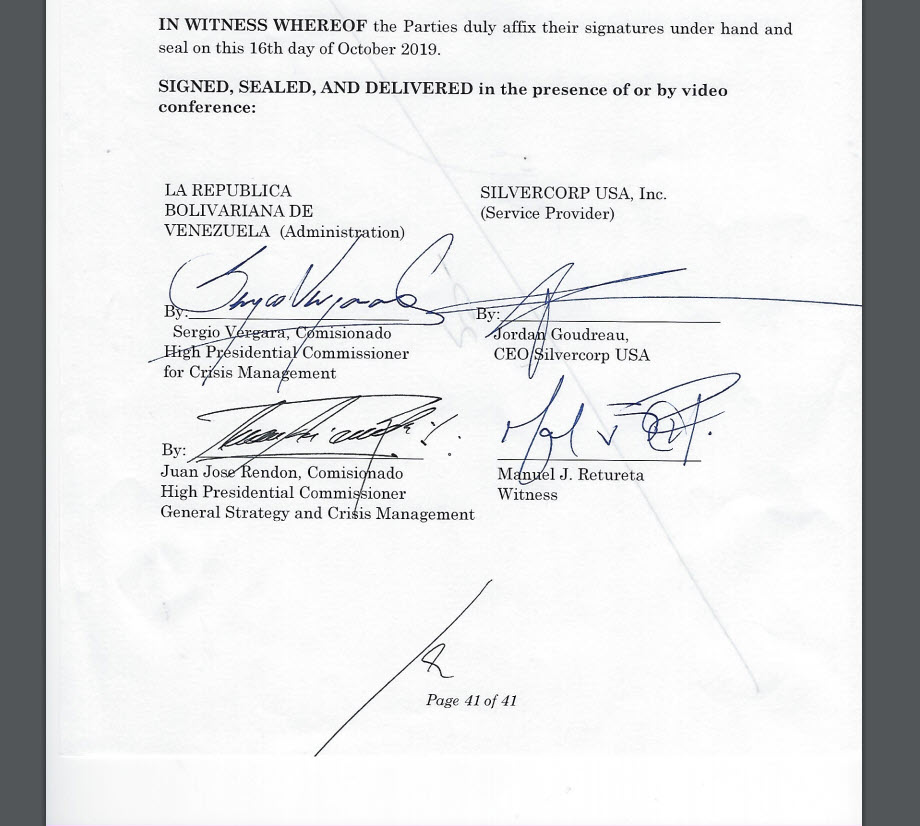
The document contains the signatures of opposition representatives J.J. Rendón, Sergio Vergara, and those of Jordan Goudreau as well as a lawyer named Manuel Retureta as a witness. Guaido’s signature is not on this page (Source: The Washington Post)
Equal Rights And Documentary Dreams
The contract also includes a number of interesting clauses including some that hint at Silvercorp USA’s future plans, which were covered by Bellingcat’s Aric Toler (@AricToler) in this Twitter thread.
One of the stipulations, found in Attachment K of the document, says that Silvercorp USA “shall strive to create” a diverse team inclusive of gender and ethnicity with a particular focus on Venezuelan citizens:
The contract’s Attachments D and J mention embedding “media teams at all stages of the operation to record documentary style footage”, while Attachment J gives the signers of the document first right of refusal for all attempts to purchase copyrighted material related to the operation:
Twitter user @z3dster spotted one instance where Silvercorp USA obviously violated the terms of the contract, found on page 27 of the document:
Unanswered Questions: The Missing Signature And The Other Document
As pointed out earlier, the document shared by the Washington Post does not include Juan Guaido’s signature alongside the other signatories on page 41.
The Venezuelan opposition’s official Twitter communications account issued a statement on May 6 (before the Washington Post published the document), saying that the document that appeared online on May 3 showing Guaido’s signature was “false”, and that it had been doctored by the Maduro government to justify Guaido’s arrest. Moreover, the statement claims that Guaido’s government “does not have any link, commitment or responsibility” to Silvercorp USA, and that Guaido never signed any document with Goudreau:
J.J. Rendón, one of the signatories of the 41-page-document published by the Washington Post, also confirmed the authenticity of the document in a May 6 interview with CNN’s Fernando del Rincon.
Crucially, Rendón claims that Guaido did not sign the earlier document that Goudreau presented, and that Guaido only knew “rough outlines of an ‘exploratory plan’” that never materialized. Rendón claims that he does not know how Guaido’s signature appeared on the May 3 document, and suggested that Goudreau procured the document in a desperate attempt to enforce the payment of the contract, even though he claims that he informed Goudreau last year that the agreement would not be going ahead.
Plagiarism. Plagiarism Everywhere.
On May 5, Twitter user @z3dster wrote a thread outlining how the SilvercorpUSA website contained text that appeared to be plagiarized from a mixture of sources. For example, @z3dster found that the Silvercorp USA terms and conditions page had been plagiarized from Masterclass. The giveaway? Silvercorp USA forgot to delete references to “Masterclass” and and hyperlinks to the website in their version:
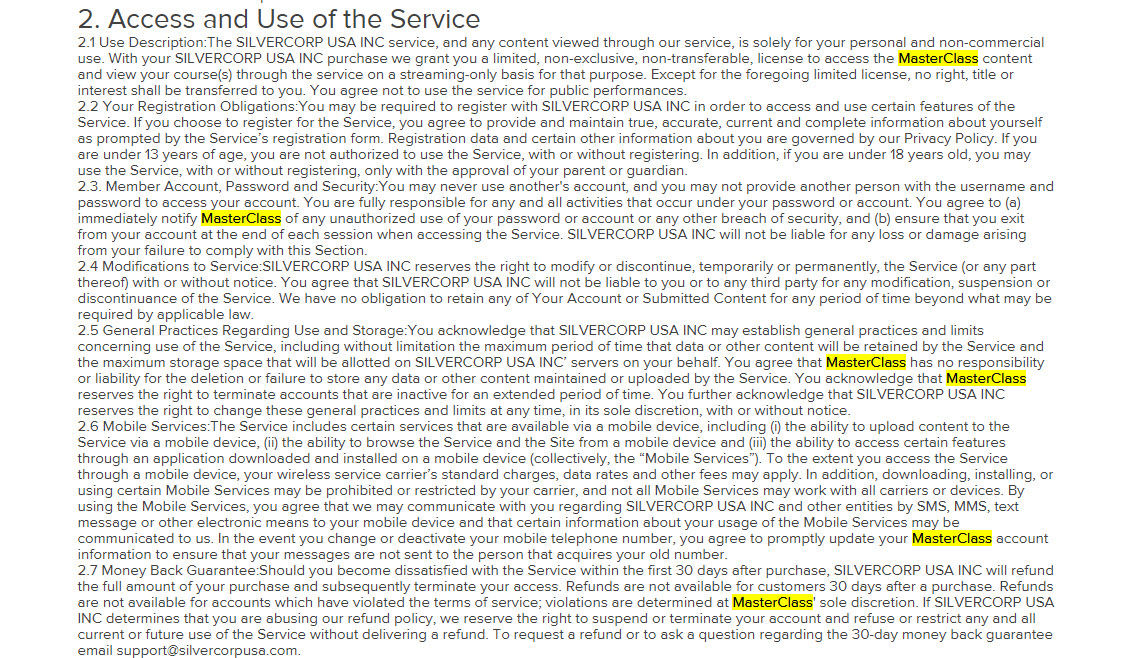
A screenshot of the Silvercorp USA terms and conditions page with multiple references to Masterclass. The hyperlinks on the page redirect to the Masterclass website (Source: Silvercorpusa.com / @z3dster)
@z3dster also found that certain sections of the document published by The Washington Post had also been lifted from other documents. As they shared on Twitter, part of the document has language identical to that in a contract that is available online from an organization called CCI Paradox Midstream LLC (note: there is no indication that the two companies are connected):
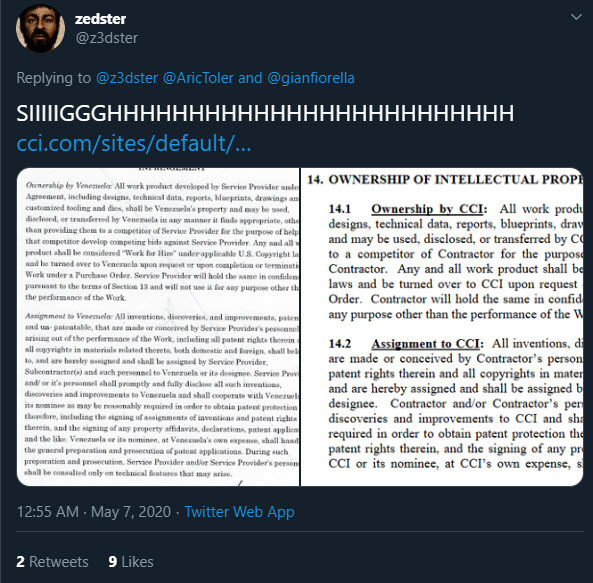
@z3dster pointed out that parts of the 41-page document published by the Washington Post had also been plagiarized from other sources (Source: @z3dster)
What Did The Maduro Government Know, And When Did They Know It?
Maduro said in a speech on May 4 that his security services “knew everything” about “Operación Gedeón”, including “… what they ate and didn’t eat.” While Maduro’s comment could be construed as a boastful flourish, there is evidence that the Venezuelan government was aware that an incursion by sea was imminent as early as March 24.
March 24 Weapon/Equipment Seizure In Colombia
On March 24, Colombian authorities seized a weapons shipment near the northern city of Barranquilla, which, they claimed, was destined for an organized crime group operating in the north of the country. The weapons included 26 rifles, over two dozen night vision goggles, and ammunition.
The man driving the shipment told the Colombian authorities that they were destined for a man nicknamed “Pantera” in Riohacha, a coastal city in northern Colombia approximately 85 kilometers from the Venezuelan border.
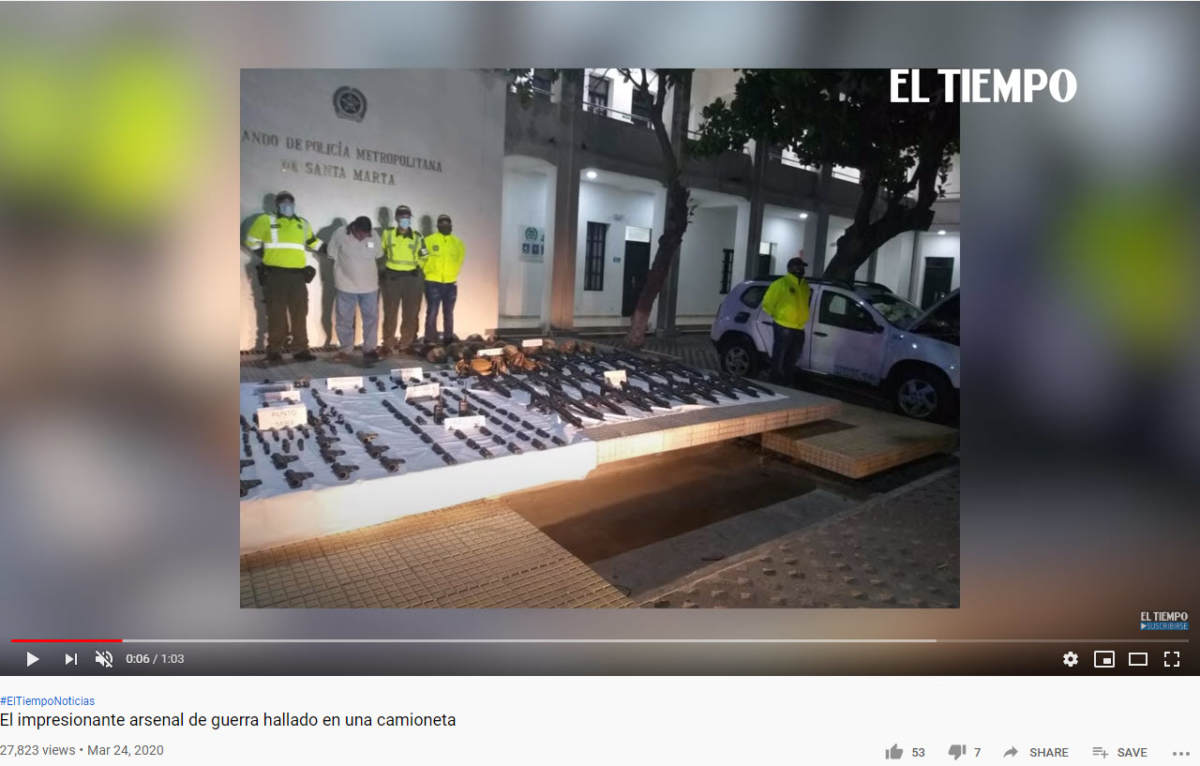
A screenshot of a video from Colombia’s El Tiempo showing the seized weapons and the detained driver (Source: YouTube/El Tiempo)
That same day, Maduro said that the weapons were in fact destined for an operation that sought to “cause chaos and violence in [Venezuela]”. A day earlier, he had hinted that “… terrorist groups from Colombia and the United States” were plotting actions against his government, and later said that the seized weapons were evidence of this.
In his interview with journalist Napoleon Bravo on May 4, Javier Nieto Quintero — one of the leaders of “Operación Gedeón” — confirmed that a member of his team called Robert “Pantera” Colina had been killed during the May 3 raid.
The @Carive15 Twitter account, which is associated with “Operación Gedeón”, posted a video on the morning of May 3 in which a man in military uniform who identifies himself as National Guard Captain Robert Colina Ibarra “pseudonym Pantera” explains that he heads “Operacion Gedeon’s Capture Team Number 3”:
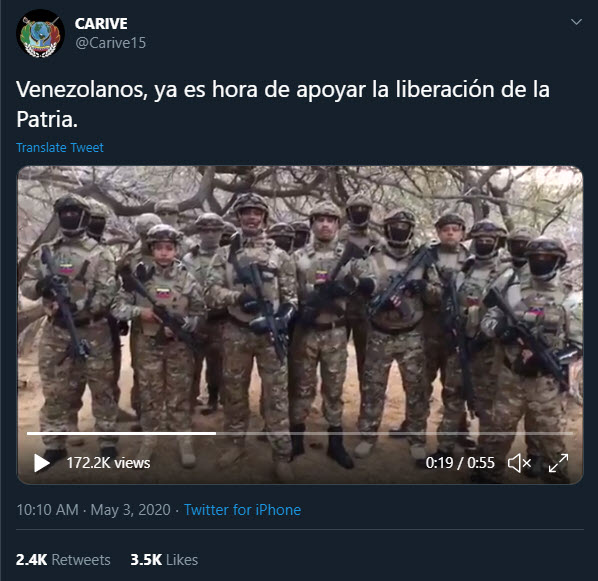
The man in the video identifies himself as Robert Colina Ibarra, a.k.a. “Pantera”, and claims to head one of the Operacion Gedeon’s teams (Source: @Carive15)
March 30 Sinking Of The Naiguatá
In the early morning hours of March 30, the Venezuelan Navy patrol boat GC-23 Naiguatá sank northwest of La Tortuga island, some 100 kilometers north of the Venezuelan mainland.
The sinking occurred after the vessel collided with the Portugal-flagged RCGS Resolute, a much larger and heavier cruise ship. An investigation by Portugal’s Gabinete de Investigação de Acidentes Marítimos e da Autoridade para a Meteorologia Aeronáutica (Office of Maritime Accident Investigations and Aeronautical Meteorology Authority, GAMA) concluded that the collision occurred as a result of the Naiguatá’s “excessive approach maneuver”, with the Venezuelan Navy confirming that it had intercepted the vessel and attempted to escort it to a Venezuelan port.
On April 1, Maduro suggested that the vessel was carrying “mercenaries” on a mission to carry out operations in Venezuela. On April 2, Admiral of the Fleet Remigio Ceballos tweeted that inflatable boats seen onboard the RCGS Resolute could move as many as 42 “commandos” to “carry out raids” on coastal areas.
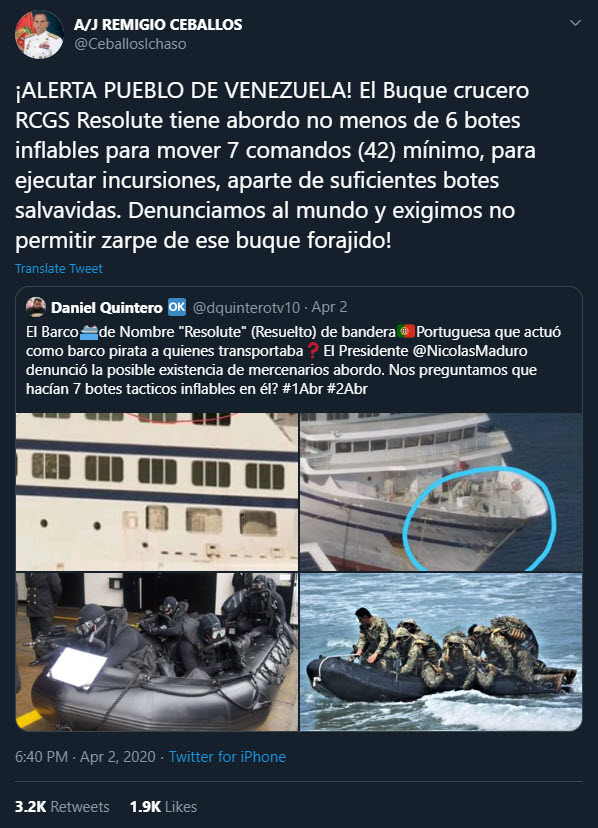
Ceballo’s tweet reads: “TO THE PEOPLE OF VENEZUELA: ALERT! The cruise ship RCGS Resolute has on board no fewer than 6 inflatable boats to move a minimum of seven commandos (42) to carry out incursions, along with enough life boats [sic]. We are denouncing this before the world and demand that this fake [cruise ship] not be allowed to sail!” (Source: @CeballosIchaso)
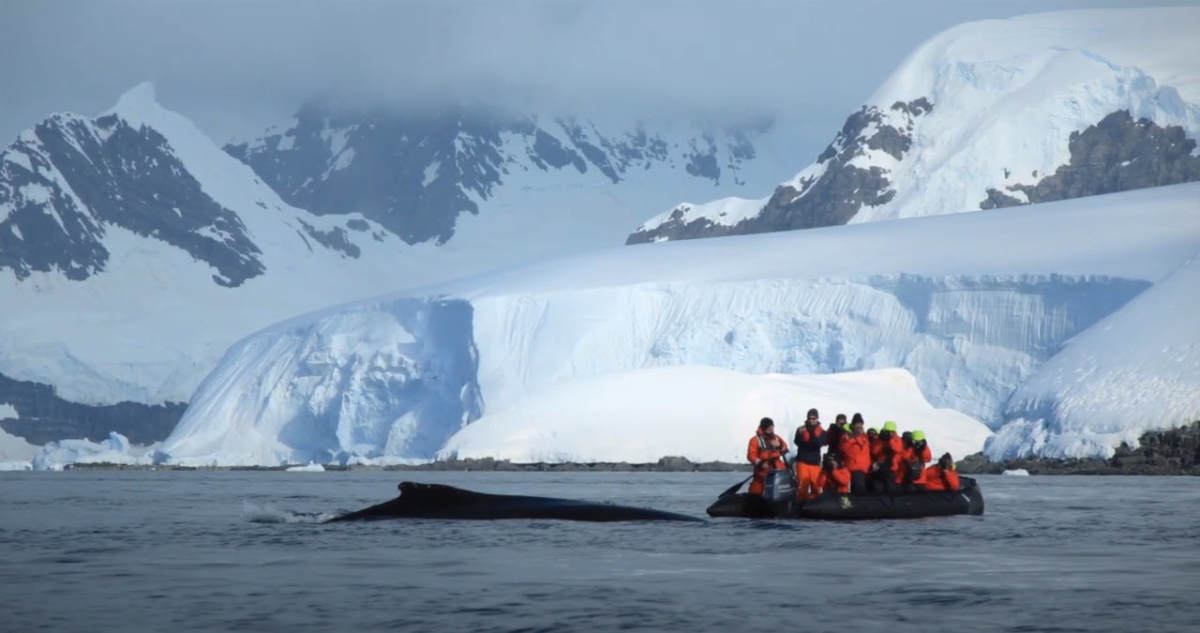
RCGS Resolute passengers whale-watching aboard one of the ship’s inflatable boats, which are called “Zodiacs” (Source: YouTube)
While there is no evidence that the RCGS Resolute was in any way involved in “Operación Gedeón”, the Venezuelan government’s statements following the sinking of the Naiguatá suggest that they were on high alert for a seaborne incursion into Venezuela by one or more small teams of mercenaries.
April 23: Government Barricades The Main Highway Connection Between Caracas And La Guaira
On April 23, images appeared on Twitter showing shipping containers blocking sections of the Caracas-La Guaira highway, the main artery connecting the capital to the coastal city.
Venezuelan media reported that military sources said that the containers, which were removed a short while after, were placed as part of a “military exercise”, with another outlet reporting that the drill involved protecting Maduro and the capital from a foreign military incursion.
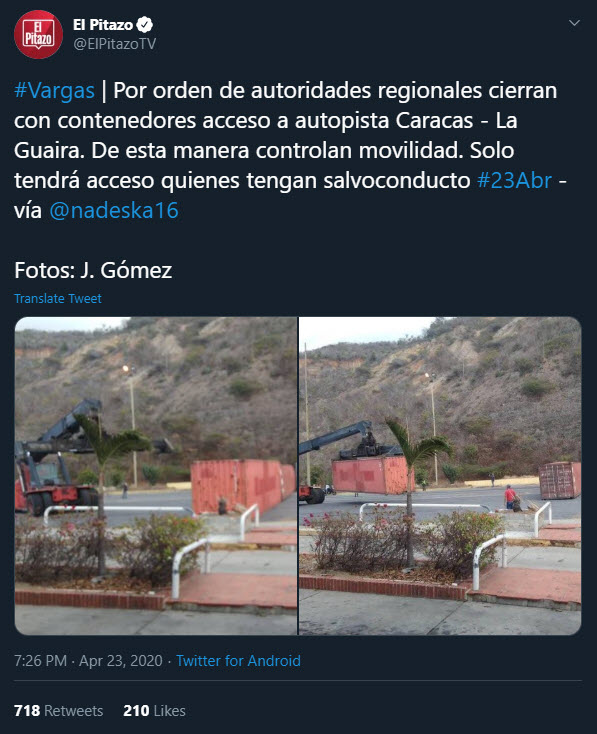
Images of the containers blocking the highway from Venezuelan news outlet El Pitazo. The tweet reads: “By order of the regional authorities, the Caracas – La Guaira highway has been closed off with containers. Movement [through the area] is being controlled. Only those who have permission can pass” (Source: @ElPitazoTV)
The blocking of the main highway connecting the capital to this coastal area could be read as an indication that the Maduro government was preparing for a hostile operation from that direction. The @ElPitazoTV report that the authorities were only allowing individuals with permission to do so to pass through the area while the containers were in place might even be evidence that the Maduro government feared that the incursion had already taken place, and was attempting to stop the raiders from entering Caracas.
WHAT’S THE ENCORE?
As the saga continues to unfold, the days ahead are likely to reveal what effort the United States will take to secure the release of Denman and Berry. Goudreau is unlikely to stop making headlines any time soon, given a recent report from the Associated Press that he is being investigated by U.S. law enforcement for arms trafficking.
The hours and days ahead will also likely determine what role Juan Guaido will continue to play in the Venezuelan political landscape, if any, given the scale of the failure of this operation.
